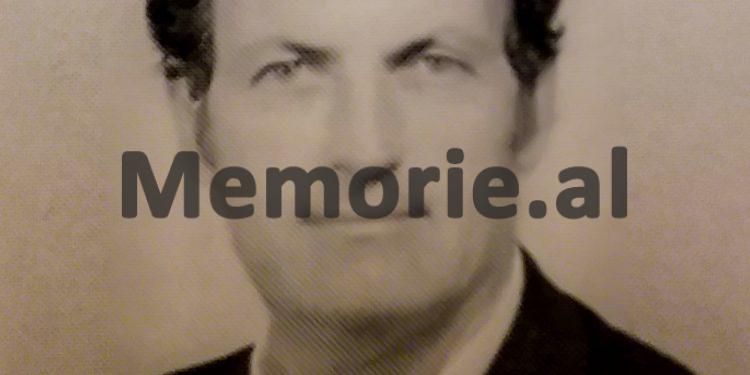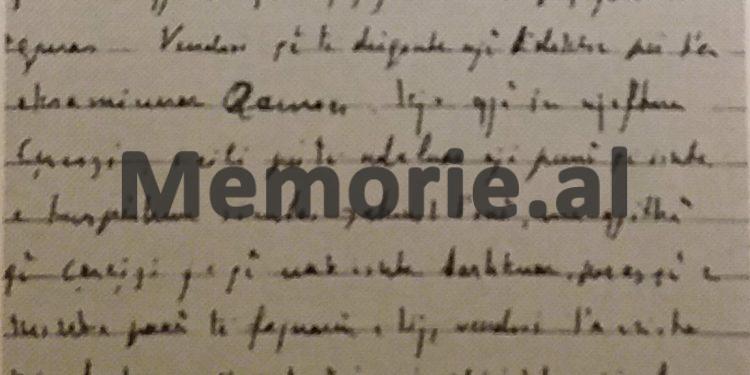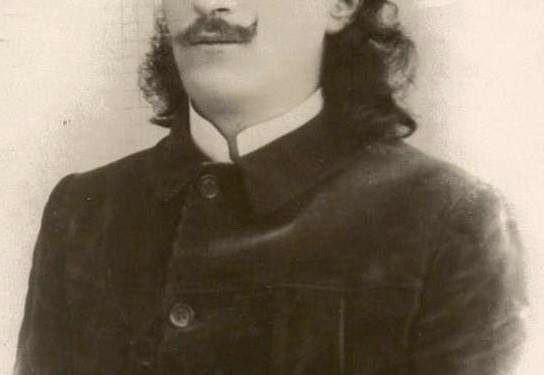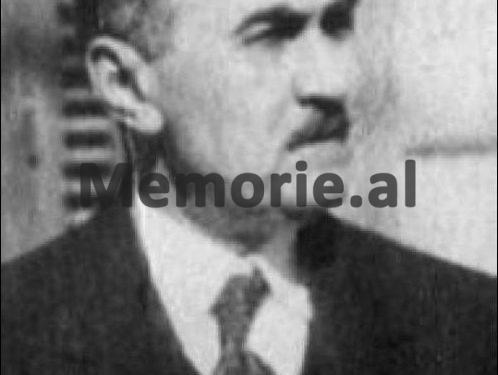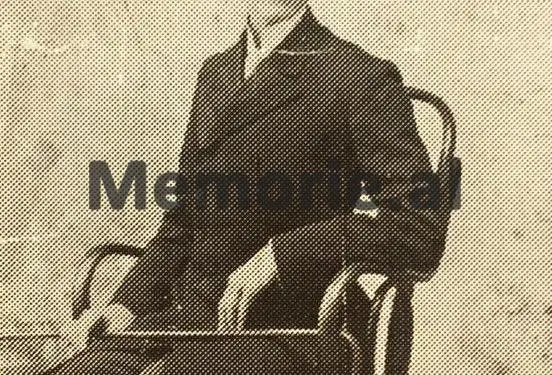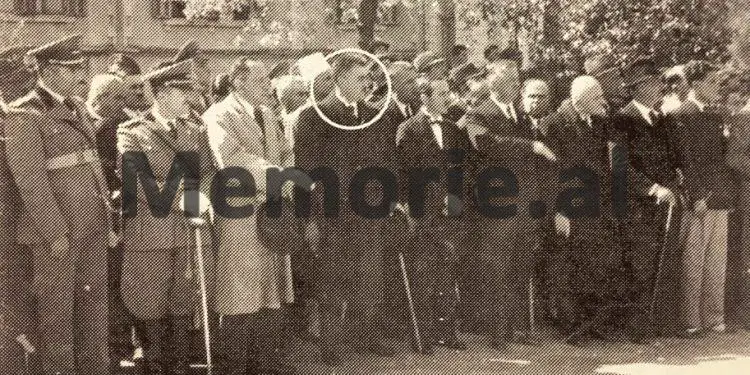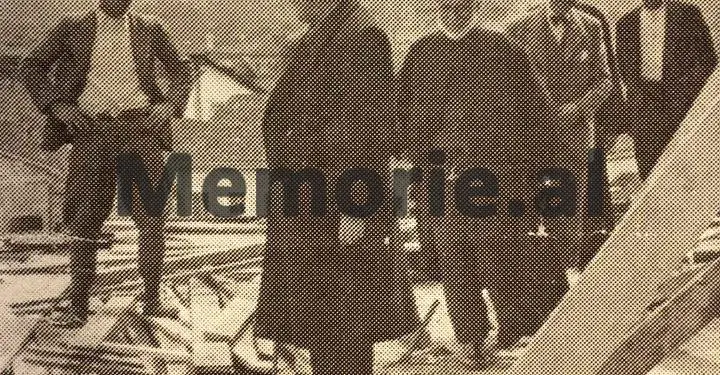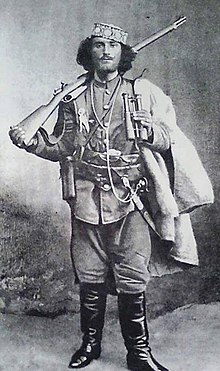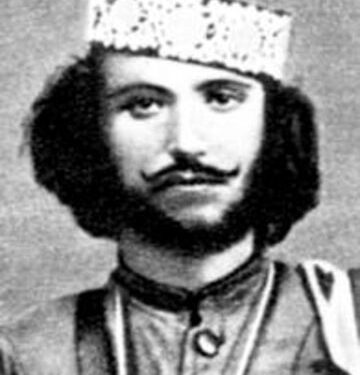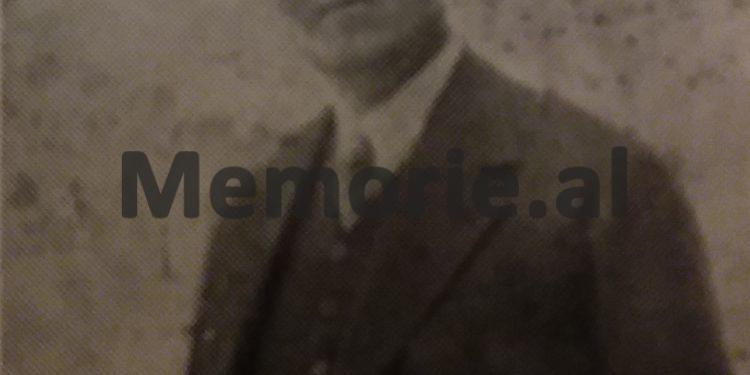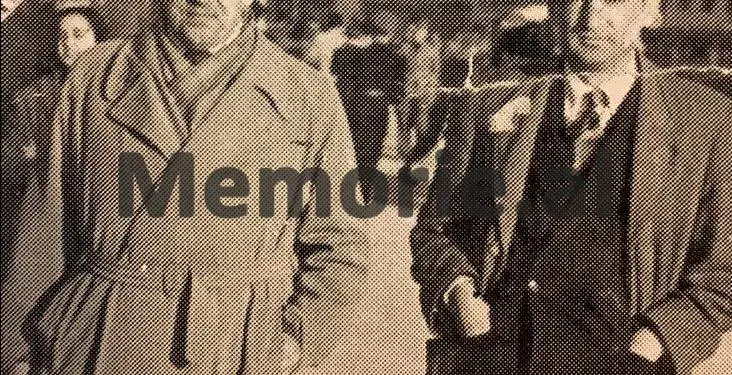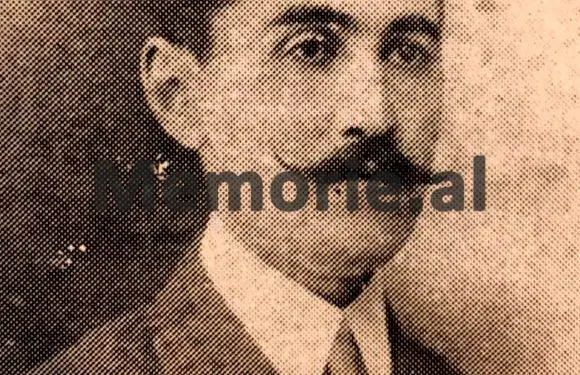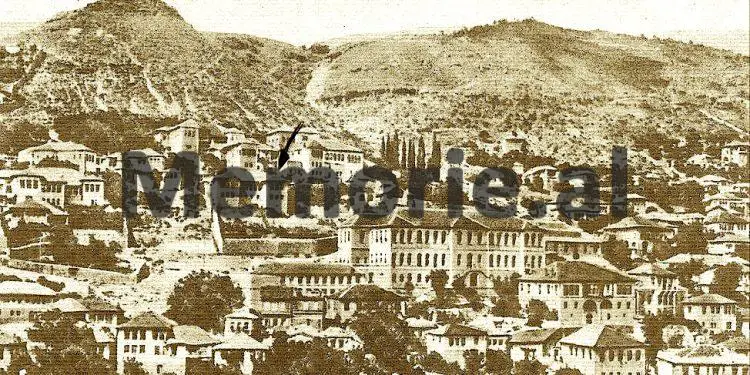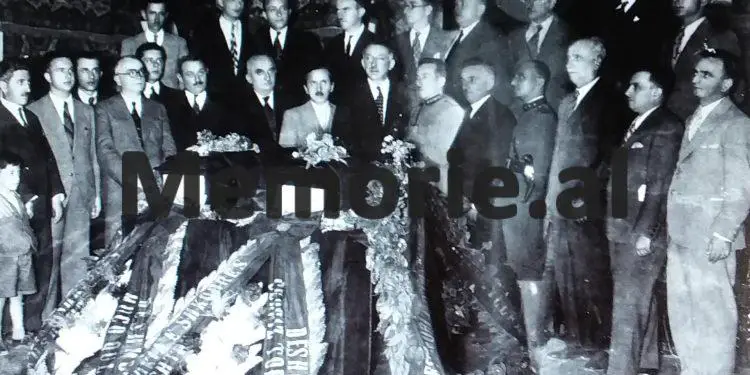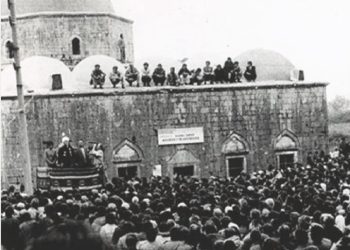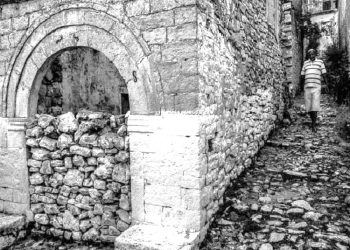Dashnor Kaloçi
Memorie.al publishes the unknown story of the much talked about event in the history of Albania that took place in March 1908, when Çerçiz Topulli, in cooperation with his committees, assassinated the Commander of the Gjirokastra Brotherhood, the Turkish Bimbashi, Halil Efendi, who was originally from Bosnia. The unknown story comes through the memoirs of Javer bej Hurshit, originally from Abkhazia, former mayor, prefect, MP, minister and senator, from the period of the proclamation of the Independence of Albania, until the end of the War in November 1944, (when he would be arrested and shot a few months later after being tried in the Special Court), which were inherited and preserved by his nephew, Shahin Hurshiti, in Tirana.
The commander of the Gjirokastra Gendarmerie, Bimbashi Halil Efendiu, from the bay, wanted to dictate who were the people who sheltered Çerçiz, to deport them. Someone reported that Çerçiz’s fiancée, Qamoja, was pregnant. If this were to be proved, it would be a living proof that Çerçiz was held by the woman tribe. So Bimbashi decided to send a doctor to examine Qamon. This was reported to Çerçiz who, in order to stop a job that was shameful according to our custom, decided to kill Bimbashi from Gjirokastra. “At the time I arrived at Hani i Çiçve at the entrance to the bazaar from Hazmurat, two shots were heard one after the other and when we approached to see what had happened, we saw Bimbashi lying on the ground and dead.” .
This is what is written, among other things, about the already well-known event in the history of Albania, which is about the murder of the Turkish Bimbashi of Gjirokastra in 1908 by Çerçiz Topulli’s gang, in the memoirs of Javer Bey Hurushiti, former mayor, prefect, MP, minister and senator from the period of the declaration of Independence until the end of the War in 1944, who a few months later, in April 1945, would be executed by firing squad, after being tried by the “Special Court” of along with 63 other defendants, all former functionaries, senior officials, and well-known intellectuals from the first government of Ismail Qemali to the last one under German occupation in November 1944.
His memoirs, Javer bej Hurshiti are in manuscript and they were written by him in four thick notebooks in 1939 and they are possessed by his nephew, Shahin Hurshiti, who made them available for us to be published by Memorie .co.uk.
But who was Javer Bey Hurshit and what is his past? How was he arrested together with his son, Mehmet, in January 1945, and why did Enver Hoxha order the return of all the belongings that were confiscated from him on the day of his arrest ?! Why did Halil Hoxha beg his son Enver not to shoot Javer with the convicts of the Special Court and what was the answer he received from him? How was Javer Bey’s family treated by the communist regime, and how were his nephew’s children preserved the famous memories of the historical events he himself had experienced, which he had written since 1939?
Regarding these and other events from the history of the Hurshiti family, we know the testimony of his nephew, Shahin Hurshiti and from the memoirs of Javer Bey, we are publishing the story of the murder of the Turkish Bimbashi by Çerçiz Topulli ç’s squad, since he is a one of the most popular figures of fighters in the South of Albania.
Regarding what pushed Javer Bey Hurshtit to write his memoirs, at the beginning of the first notebook he said: “Unfortunately, very few, very few are those Albanians who have kept notes of their memoirs. I, almost, have been involved in all the national movements that have taken place in the province of Labëria: I have not been shaken from Gjirokastra all the time of the Greek and Italian occupation: I have witnessed so many important events that as in those times, t You have recorded the events day by day, today you will be able to publish the complete history of Gjirokastra from 1912 to 1925. Exactly the history of those times that are very important for the history of our National Renaissance, today I decided write the memoirs, but these will be very flawed. I have forgotten many important dates and many names of people who have played important roles. Therefore, these memories will serve my family more than they serve the history of the country. ”
Javer Hurshiti
14-Autumn of I-939, Tirana
Who was Javer bej Hurshiti?
According to the memoirs that Javer bej Hurshiti left written by his hand, he was born in Abkhazia (Soviet Caucasian Republic) around 1883. He came to Albania around 1889, when he was not more than six years old, after being adopted by Maliq Pashai, who was from Libohova in Gjirokastra. Maliq Pashai was the grandson of Shanisha, the sister of Ali Pasha Tepelena. He was married for the first time to the daughter of Tahir Bey from Gjirokastra, whom he divorced only a few months later, and for the second time he married Shemshie Hanemi, who was the daughter of Nurullah Bey from Gjirokastra, with whom he had four daughter of four sons. After many years of having eight children, Shemshie Hanemi fell ill with tuberculosis and for this reason Maliq Pasha, decided to remarry. But in order not to upset his wife and children, he did not want to marry a woman from an Albanian family, he decided to marry her by marrying a jarija (slave). In this regard, in his memoirs, Javer Bey writes: “At the beginning of the nineteenth century, Maliq Bey went to Istanbul and bought for 300 Turkish lira, Esma Hanemi, who at that time was, as she said, 17 years old, and Maliq Pashai 50 years old. At that time, boys and girls were sold freely in the Istanbul market, most of them being Circassians. This nation, after fighting bravely against Russia for 50 years, was finally invaded by it. The vast majority of the Muslim, Caucasian, and Ashka populations with them and the Circassians emigrated to Turkey, where most of the emigrants, unable to make a living, began to sell their children. This was done mainly with Circassian girls who were known for their beauty and most were bought for the Sultan’s palace. So after buying Esma Hanemi in Istanbul, Maliq Pashai kept her as a wife and sent her to live inside his mansions in Libohova, where he owned the property. Although she also had Shemsie Hanemi as a wife, Maliq Pashai also supported Esma, giving birth to him and three daughters and a son, but none of whom lived more than two years. Maliq Pasha was suggested that in order to take care of the children, he should free Esma from slavery and establish a crown with her. Maliq Pashai did so and entered into a legal marriage with Esma, with his recommendation he adopted a child named Ferhat, who was killed in a quarrel at the age of 25, with a guard in Libohova. In these dramatic circumstances for Esma, Maliq Beu suggested that she adopt another child, to have her as her child. “Thus, Maliqi’s sister, Shanishaja, who was staying in Istanbul, by the order of Maliqi himself, finds a little boy about five years old, a Circassian cigar who was from a noble family”. This boy that Maliq Bey’s sister found in a rich Albanian family in Istanbul and took for his brother and wife, was Hurshit, whom Maliq Bey and Esma later renamed Javer. In this regard, in his memoirs, among others, Javer bej Hurshti writes: “I came to Libohova in 1890. As for the year, I am sure that as Esma Hanemi told me, I came to Libohova without completing the year that Ferhati had died. As in a dream, I remember that when I came to Sarajet in Libohova, they took me straight to the room of Pasha, who according to the custom was lying near the fire and around him were cats. I entered the room with a stick in my hand and as soon as I saw the cats I started beating them with a stick. Pashai laughed and said: “this boy has come to us in vain, he will become very wise”. Maliq Pashai and Esmaja, his wife, considered the adopted son, Javer, as if they had their real child. Likewise, Javeri loved and respected them very much and about which he wrote: “I did not want in any way to leave my mother, whom I loved more than a real mother and she loved me more than a boy in my womb. I did not feel at all circus. You were so Albanianized and the Albanian nationalist ideas ruled me so much that I could not leave Albania even a sultan if they made me ”.”. The little week was held by two parents who adopted her in fabulous conditions. He was educated at his home in the mansions of Libohova with private tutors coming from Gjirokastra who were very well paid by Maliq Pashai. He passed the high school exams at the “Zosimea” gymnasium in Ioannina and then finished high school in Istanbul. Yes with private tutors, he learned French, Italian, Greek and Turkish that he knew quite well from a young age. In 1889, Maliq Bey died and Javeri was left alone with Esma in the palaces of Libohova. They stayed there until 1900, when they moved to Gjirokastra. Javeri went on holiday to Athens every year, where he was called the Beu of Megalles, a title he had received since he was 12 years old. Even after he grew up, he constantly went to Athens where he had made many friends and had his manor in Argjirohar. After 1900, Javeri settled in Gjirokastra and began to engage in the public life of the city, making a name for himself at a very young age when he was not yet in his twenties. Regarding this, Javeri writes in his memoirs: “In 1900, we bought the house of Nurullah Bey in Gjirokastra, for 700 Turkish lira. In 1902 came Xhavid Pashaj, Prefect of Gjirokastra, who was an ardent Circassian nationalist. His wife was the sister of the famous Hasan Çerqezi, who killed the entire Council of Ministers when they overthrew Sultan Aziz. When Xhavid Pashai found out that there was a Circassian boy in Gjirokastra, he sent and called me to his house. As soon as he saw me, he said: you look from the face that you are a circus. After that Pashai started to love me as his son and even though I was young, he often asked me and many times he liked my opinion. I was then teaching Arabic at the Madrasa and in 1902 you were appointed a member of the School Council and an inspector of the city’s primary schools. I did these tasks without pay to please Xhavid Pasha, who trained me for official duties. Supported as you are by Xhavid Pasha, I started to have some position and all the civil servants honored me. I was also honored by the people of Gjirokastra, who prayed for my needs in the Prefecture. This is how I started to be called in Gjirokastra as an influential person and who approached the local authorities. “But this influence of mine was known that it would not last long after the departure of Prefect Xhavid Pashaj, so I tried to do my best to secure my position with the local public.” Javeri, in addition to the work he began to perform in the state administration of Gjirokastra, devoted considerable time to books and about which in his memoirs he writes, among other things: “You are friends with the Greek consul of Gjirokastra, with whom they exchanged novels In French. “One day he sent me a novel which he had wrapped in an old Greek newspaper.” Javeri was also very enthusiastic and after the theater, he went to Athens to attend the performances that were given there. Javer Hurshiti together with his mother Esmanë, lived a mundane life immersed in luxury, spending as a family 700 to 900 Turkish lira a year from the great wealth that was left to you after the death of Maliq Pasha. They carried around them many servants and personal guards, and their properties were located within the borders of Albania, starting from Radati in Kakavije, Bularat, Zervat, Voshtina, up to the mountain Makri-Aleksi and Koshovica of today’s Greece. So many of these properties like agricultural land, pastures, forests, mills etc., they were not in condition to be able to contact directly the Greek nationals who were using our lands to rent them to you. But our Greek farmers deposited property rents that belonged to us in Greek banks where they also had account numbers. “We always took from them as much as they gave us and we never forced them to pay as much as they owed, because we had so much property, that whatever the farmers’ obligations were, we were overwhelmed.”
Memories of Javer bej Hurshit
Why did the Circassian Committee come out?
The various distinguished committees that ran for the yoke of the Ottoman Empire, had for many years organized Committees and possibly by any means to escape the yoke. Any nation had organized committees of committees to disturb the peace. Macedonia in particular was full of Bulgarian and Greek committees. The committees of these two Nations, fighting against the common enemy, Turkey, were fighting with each other because they could not come to an agreement to determine the area of influence according to race. At that time, the Albanians living outside Turkey, especially those in Bucharest and Sofia, willingly and with newspapers invited the Albanians living in the homeland to rise up against Turkey and not leave the square free only to Bulgaria, Greece and to some extent Romania.
Shahin Be Kolonja with his newspaper and Faik Be Konica with the temporary one, propagandized to wake up the Albanians to return the rifle to the Turk. Their sacred purpose, among the voices complaining about the Ottoman election, should be heard and the voice of Albania to be able and this to have the right to ask for its independence when the time comes for the destruction of Turkey. This time you clearly understand that he had approached.
The first, if I am not mistaken, to go to the mountains against Turkey was Bajo Topulli from Gjirokastra. This was the director of the gymnasium in Thessaloniki. Patriotism pushed him to quit his job and run away. After a few months, he was accompanied by his brother Çerçiz Topulli, Mihal Gramenua from Korça and some others of lesser importance. Bajua was not a man of this craft, so the small Albanian squad is commanded by Çerçiz. The Turkish government considered this small Albanian gang much more dangerous than thousands of Greek and Bulgarian committees.
The Albanian detachment, which was of the same religion as the Turks, had a special significance in the opinion of the outside world, while the Bulgarians and Greeks could be called elements who hated the Turks, as they had another religion and their uprising did not necessarily prove administration. barbarian of Turku. The Albanian squad, composed mostly of Muhammadans, clearly proved that the Turks were not able to please the peoples who honored their flag, even that part of the people who had a common religion.
When Çerçiz assassinated the Despot of Korça, the Turkish government stepped up its forces to capture Bajon and Çerçiz. The activity of this heroic gang takes place more in Korça, Kolonjë and Gjirokastër. When the Turkish Kushellas pursued Çerçiz on foot, he burned the school and several other buildings in the village of Kustanjan, near Koshovica, to avenge Refik Budo from Gjirokastra that the Greek committees, Vasil Killov’s squad, burned down the tower in the village of Lluvina.
The murder of the Bosnian Bimbashi, Halil Efendiu
Çerçizi had his hiding place in the city inside Gjirokastra and in the village of Mashkullore and in Kardhiq where he also had his fiancée, Qamon, and granddaughter of Mirka’s sister that we mentioned above, when we talked about the destruction of Baba’s tekke. Hajdari. The commander of the Gjirokastra Gendarmerie, Bimbashi Halil Efendiu (Bosnian) from the bay, wanted to dictate who were the people who sheltered Çerçiz, to deport them.
Someone reported that Çerçiz’s fiancée was pregnant. Proving this would be a living proof that he is held by the woman tribe. Decided to send a doctor to examine Qamon. This was reported to Çerçiz, who in order to stop a job that was shameful according to our custom, even though Çerçiz had not joined, but had not even seen his fiancée, he decided to kill Bimbashi of Gjirokastra. , who was an aged officer but very skilful.
They wanted to kill him in Berat as well, but he escaped with only a serious wound. As I said on page 45, leaving the sick mother dollars to go shopping. Bimbashi was staying at the house of Dervish Pasha’s lady, the neighbor with us. When I passed Xhafer Karalliu’s houses, I saw that Bimbashi came out of his house and started to climb up. When I arrived at Hani i Çiçve, at the entrance of the bazaar by Hazmurat, two guns were heard one by one. With the crowd you came back and I to see what happened: for the oven and the gurgles we saw Bimbashi lying on the ground, who had died.
By the time I arrived in the Prefecture, gunshots were heard from the other side of the Palorto creek. Çerçiz had sent two people to the city, Hito from Kardhiqi and Hajredin from Tremisht i Përmetit, to kill Bimbashi. Çerçiz himself and his other friends had taken up residence on Palorto’s lair. These two welcomed Bimbashi to my oven. Even when I came, they stood up and honored me. When the toast Bimbashi fell from behind and when he reached the place we said, he performed their patriotic duty and turned back down again.
Going from the flowers, they went to the place where Çerçizi was waiting for them. The gendarmes were following them, but Çerçizi hit them with his friends, and so Çerçizi joined him and with the two friends who came to him, he climbed the mountain and shot at the gendarmes so that they would not approach him. We from the Prefecture saw both the gendarmes and Çerçiz’s gang until they left. This event forced me not to return home quickly and eat lunch outside. When you got home, I went straight to my mother’s room. I found this one sitting in an armchair near the window and smoking. I started reporting the murder of Bimbashi and apologized for being late. He did not answer me at all. I thought he was angry at my delay, that when he refused to eat lunch outside. After a while I found out that my mother had lost her mouth, she could not speak, maybe she could not hear. Dr. Taseja informed me that there was no hope left for her salvation, though she seemed to be calm and felt no pain. Near the middle of the night he lay on the mattress and died after forty-eight hours, the last day of February, or the first day of March 1908. (Old Calendar) ./Memorie.al
Continues tomorrow




